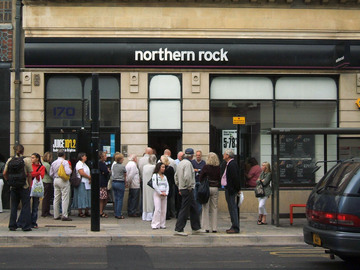Regulatory disruption
 The financial revolution due to hit Britain in mid-January has had surprisingly little publicity and has little to do with the money-related things making news headlines over the last few years. In other words, it's not a new technology, not even a cryptocurrency. Instead, this revolution is regulatory: banks will be required to open up access to their accounts to third parties.
The financial revolution due to hit Britain in mid-January has had surprisingly little publicity and has little to do with the money-related things making news headlines over the last few years. In other words, it's not a new technology, not even a cryptocurrency. Instead, this revolution is regulatory: banks will be required to open up access to their accounts to third parties.
The immediate cause of this change is two difficult-to-distinguish pieces of legislation, one UK-specific and one EU-wide. The EU piece is Payment Services Directive 2, which is intended to foster standards and interoperability in payments across Europe. In the UK, Open Banking requires the nine biggest retail banks to create APIs that, given customer consent, will give third parties certified by the Financial Conduct Authority direct access to customer accounts. Account holders have begun getting letters announcing new terms and conditions, although recipients report that the parts that refer to open banking and consent are masterfully vague.
 As anyone attending the annual Tomorrow's Transactions Forum knows, open banking has been creeping up on us for the last few years. Consult Hyperion's Tim Richards has a good explanation of the story so far. At this year's event, Dave Birch, who has a blog posting outlining PSD2's background and context, noted that in China, where the majority of non-cash payments are executed via mobile, Alipay and Tencent are already executing billions of transactions a year, bypassing banks entirely. While the banks aren't thrilled about losing the transactions and their associated (dropping) revenue, the bigger issue is that they are losing the data and insight into their customers that traditionally has been exclusively theirs.
As anyone attending the annual Tomorrow's Transactions Forum knows, open banking has been creeping up on us for the last few years. Consult Hyperion's Tim Richards has a good explanation of the story so far. At this year's event, Dave Birch, who has a blog posting outlining PSD2's background and context, noted that in China, where the majority of non-cash payments are executed via mobile, Alipay and Tencent are already executing billions of transactions a year, bypassing banks entirely. While the banks aren't thrilled about losing the transactions and their associated (dropping) revenue, the bigger issue is that they are losing the data and insight into their customers that traditionally has been exclusively theirs.
We could pick an analogy from myriad internet-disrupted sectors, but arguably the best fit is telecoms deregulation, which saw AT&T (in the US) and BT (in the UK) forced to open up their networks to competitors. Long distance revenues plummeted and all sorts of newcomers began leaching away their customers.
For banks, this story began the day Elon Musk's x.com merged with Peter Thiel's money transfer business to create the first iteration of Paypal so that anyone with an email address could send and receive money. Even then, the different approach of cryptocurrencies was the subject of experiments, but for most people the rhetoric of escaping government was less a selling point than being able to trade small sums with strangers who didn't take credit cards. Today's mobile payment users similarly don't care whether a bank is involved or not as long as they get their money.
Part of the point is to open up competition. In the UK, consumer-bank relationships tend to be lifelong, partly because so much of banking here has been automated for decades. For most people, moving their account involves not only changing arrangements for inbound payments like salary, but also also all the outbound payments that make up a financial life. The upshot is to give the banks impressive customer lock-in, which the Competition and Markets Authority began trying to break with better account portability.
The larger point of Open Banking, however, is to drive innovation in financial services. Why, the reasoning goes, shouldn't it be easier to aggregate data from many sources - bank and other financial accounts, local transport, government benefits - and provide a dashboard to streamline management or automatically switch to the cheapest supplier of unavoidable services? At Wired, Rowland Manthorpe has a thorough outline of the situation and its many uncertainties. Among these are the impact on the banks themselves - will they become, as the project's leader and the telecoms analogy suggest, plumbing for the financial sector or will they become innovators themselves? Or, despite the talk of fintech startups, will the big winners be Google and Facebook?
The obvious concerns in all this are security and privacy. Few outside the technology sector understand what an API is; how do we explain it to the broad range of the population so they understand how to protect themselves? Assuming that start-ups emerge, what mechanisms will we have to test how well our data is secured or trace how it's being used? What about the potential for spoof apps that steal people's data and money?
It's also easy to imagine that "consent" may be more than ordinarily mangled, a problem a friend calls the "tendency to mandatory". It's easy to imagine that the companies to whom we apply for insurance, a loan, or a job may demand an opened gateway to account data as part of the approvals process, which is extortion rather than consent.
This is also another situation where almost all of "my" data inevitably involves exposing third parties, the other halves of our transactions who have never given consent for that to happen. Given access to a large enough percentage of the population's banking data, triangulation should make it possible to fill in a fair bit of the rest. Amazon already has plenty of this kind of data from its own customers; for Facebook and Google this must be an exciting new vista.
Understanding what this will all mean will take time. But it represents a profound change, not only in the landscape of financial services but in the area of technical innovation. This time, those fusty old government regulators are the ones driving disruption.
Illustrations: Northern Rock in 2007 (Dominic Alves); Dave Birch.
Wendy M. Grossman is the 2013 winner of the Enigma Award. Her Web site has an extensive archive of her books, articles, and music, and an archive of earlier columns in this series. Stories about the border wars between cyberspace and real life are posted occasionally during the week at the net.wars Pinboard - or follow on Twitter.